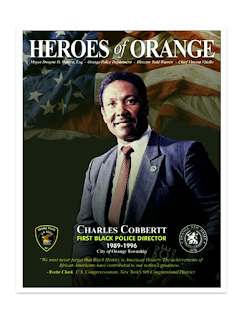Charles Cobbertt - retired Police Director
Charles "Charlie" Cobbertt’s life story is a powerful example of overcoming adversity and leading revolutionary change. Charlie’s early life, deeply influenced by his upbringing in the segregated South, set a foundation of resilience and determination. He was born on June 24, 1939, in Drew, Mississippi, a place and time rife with poverty and racial challenges.
Moving to Memphis, Tennessee, with his family at a very young age, further exposed him to the stark inequalities of the time, deeply influencing his perspective and sense of justice. His journey from Mississippi to New Jersey was marked by personal growth, shaped by the struggles and experiences of living as a Black person in America during that era. At Booker T. Washington High School in Memphis, Charlie's sense of social awareness and responsibility began to take root. This period was crucial in developing the values and strengths he would carry into adulthood.Rising to become the first African American Police Director in Orange, NJ, his achievement signaled a critical shift in addressing racial biases within the police force. Charlie's tenure as a law officer was characterized by courageous confrontations with racial discrimination and the inherent dangers of police work, including surviving a shooting only two years into his career. His leadership as Director boldly challenged conventional norms, mirroring his deep commitment to justice and community service. This brief biography explores the life of Charlie Cobbertt, a man whose commitment to equality and fairness left an impact on his community, family and the City of Orange.
Find out more about Charles Cobbertt, former Orange Police Director.
Charles’ tenure at the Orange Police Department was characterized by his consistent advancement, confronting and overcoming inequality, and exhibiting strong leadership from the outset. Sworn in on April 5, 1968, in a predominantly white police force, he immediately faced widespread racial prejudices. His commitment shone through as he skillfully managed his patrol duties while steadily climbing the ranks. As one of only thirteen black officers in an eighty- two member department, Charles faced significant barriers of inequality. This experience motivated him to become a member of the Orange Kinsmen Inc., an organization dedicated to improving the relationship between the police and the community and addressing the internal issues within the department.
Charlie’s career trajectory saw him taking on various roles within the department, from street patrols to the Community Relations Bureau. His most significant career milestone came with his appointment as the Director of the Orange Police Department in 1988, a role he assumed with a vision to eradicate low morale and favoritism within the department. With over twenty years of law enforcement experience by then, Charlie was the first black person to hold this prestigious position. His appointment as director was not just a personal accomplishment but a groundbreaking moment for the department and the community. It symbolized a shift towards more inclusive and equitable leadership within law enforcement.
One of Charlie's most notable actions was hiring Fayetta Bland, the first woman Police Officer for the City of Orange. A few years later he also hired Officer Joyce Carnegie on January 9, 1995. Officer Carnegies' tragic death in 1999, as a result of an armed robbery suspect's gunfire, profoundly impacted the department and the community. This incident was extensively covered in the media, highlighting the dangers and sacrifices inherent in Law Enforcement.
During his tenure, which spanned the late 1980s and early 1990s, Charlie tackled various challenges head-on. He was instrumental in implementing policies that promoted inclusivity and fairness within the Orange Police Department. Charlie understood the significance of police visibility and community engagement, leading to his decision to assign two officers to foot patrols in the shopping district. This strategy not only increased officer presence but also improved public safety perceptions. Charlie's response to various critical incidents, including his management of internal affairs and his approach to community policing, demonstrated his balanced and reformative approach to leadership. His leadership not only addressed the immediate challenges of crime and safety but also initiated long-term positive changes, setting a precedent for future reforms in New Jersey's law enforcement community.



Comments
Post a Comment